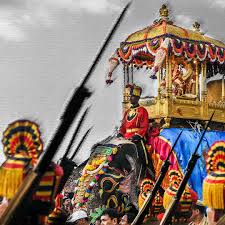Basic structure: On the Mysuru Dasara festival.
There can be no restriction in a public event on the basis of religion.
The Supreme Court of India recently reaffirmed that secularism is a fundamental principle and part of the basic structure of the Constitution of India. While this is a welcome restatement, it is concerning that the Court has to periodically reiterate this foundational aspect of Indian nationhood. The need arose from a misguided petition that sought to communalise a moment of celebration for all Indians. The Karnataka government had invited International Booker Prize-winning Kannada writer Banu Mushtaq, who is Muslim, to inaugurate the Mysuru Dasara festival at the Chamundeshwari Temple — which she did on Monday. This festival, a State-sponsored cultural event that is not purely religious, serves as an occasion for all communities to come together and share in the joy of the festival. The petition filed in the Court alleged that Ms. Mushtaq’s participation violated Articles 25 and 26 of the Constitution, which guarantee freedom of religion. A Bench of Justices Vikram Nath and Sandeep Mehta rightly dismissed the petition, clarifying that the Dasara festival is a State event, not a private religious ceremony. The Court emphasised that the State cannot discriminate based on religion when organising public events and questioned whether the petitioner had even read the Constitution’s Preamble, which unambiguously promotes equality and secularism. The Karnataka High Court had previously upheld the government’s decision, stating that a person of one faith participating in the events of another does not violate anyone’s constitutional right.
The constitutional right to practise and profess religion cannot be interpreted as a right to restrict others from participating in a faith’s practices. Restricting participation in any public gathering based on religion is indefensible in a pluralistic society. Although some places of worship still limit access to certain groups, such practices remain a source of legal and ethical debate. Those who perceive a threat to their religion from someone who is voluntarily and happily joining its festivities are either cynical or cunning. In fact, over many centuries and across different geographies, festivals and pilgrimages have united India’s diverse population, often transcending social barriers. The acceptance of this shared, mixed cultural heritage is a common thread among all Indian political parties, even amid their disagreements. However, a new group of political opportunists is exploiting this harmony by creating communal rifts, turning the logic of coexistence on its head. As the Supreme Court has demonstrated, these individuals need to be held accountable.
